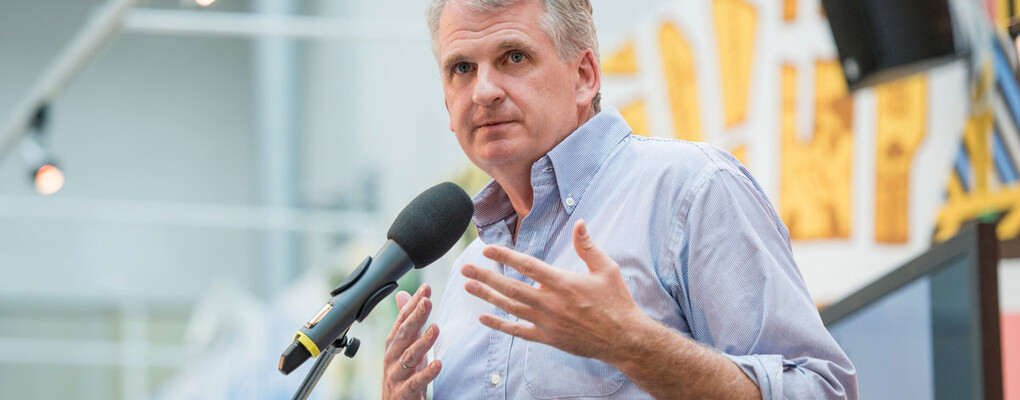
On July 1st 2020 the House of European History was delighted to host an online lecture from renowned history professor and author Timothy Snyder. An audience from around the world tuned in to our live stream to attend this virtual lecture. Against the backdrop of the current COVID-19 crisis, Professor Snyder explored how a post-imperial historical context and discourse have influenced, to a different extent and in different ways, the United States and the European Union’s reactions to the pandemic.
According to Timothy Snyder, the developing crisis in the United States is a predictable outcome of the current administration’s attempt to return to national statehood. This wish has so deeply impacted the rhetoric surrounding the pandemic that it has left the country unable and unwilling to respond to the crisis with proper measures, out of fear that this could compromise the idea that the nation state is indeed not without flaw. Insisting on this flawlessness and blaming other nations, Professor Snyder explained, is a common feature of post-imperial rhetoric.
Turning to the European case, Professor Snyder emphasised how recent polling showed that a majority of the EU citizens agree that the European Union should be strengthened in the current circumstances. What is it about the European Union that makes it easier for Europeans to handle a crisis like the Covid-19 pandemic? According to Snyder, the short answer to this question is that the European Union seems to be a better answer to the question of what to do after empire. However, he also asserted that the risk and problem to Europe is the ‘fable of the wise state’. Boiling the story of how the European Union came about down to the simplicity of ‘after two world wars, peace was more desirable and therefore the countries began to cooperate’ is, to Snyder, deeply harmful - it is just ‘another national myth at a higher level’. Insisting on the fact that the European project derives from nation states that learned from history and past mistakes puts the European project at risk. Noticeably, Snyder argues that the founding countries of the European Union because of their former empires were never nation states, but that the course of history compelled countries like France and Germany to seek an economic and political partnership after losing their empires, which ultimately made way for European integration. In his closing arguments Professor Snyder returned to his starting point and made the assertion that because European countries chose alliance over national ideologies and the isolation that can characterise nation statehood, the EU seems, at least momentarily, to have a better capacity when it comes to handling a crisis like the current pandemic.
At the end of his lecture, Professor Snyder answered a few questions from the audience.
A viewer asked Professor Snyder to offer his view on Eastern European populists yearning for a nation state. “I think it is a position of luxury,” Snyder said, explaining that at times countries within the EU tend to forget why they joined the Union – for some eastern European countries, it was a choice between Russian imperialism and integration, with many countries choosing the latter for prosperity and security reasons. Timothy Snyder shared his concern about the impact populism and its endeavour to glorify certain periods of the national past has on education and the long-term political consequences.
Reacting to questions concerning Europe’s (post) imperial history, Professor Snyder sent a strong message: ‘Make European history (...) more complicated, but also grander and bigger, by including the imperial part’. He used the example of Robert Schuman, an essential figure of European integration history, who, one should remember, was also the foreign minister of a country at war (in Indochina) at the time when he made his famous declaration.
For Professor Snyder, the EU should confront the reality of its foundation: what to do after empire? This involves dispensing with the pride of the founding myth (war never again) and addressing the painful (colonialism). Then maybe Europe in search of a narrative will be able to build for itself ‘a story with a future’, that looks into the challenges of the 21st century.